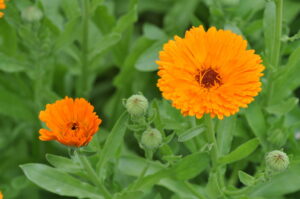Calendula Officinalis Flower Extract*
Extract of marigold has a soothing effect, is anti-inflammatory and stimulates cell renewal.
The Plant – Calendula
Plants in the daisy family Asteraceae, native to the area from Macaronesia east through the Mediterranean region to Iran. It is the flower of the month October.
The name Calendula stems from the Latin kalendae, meaning first day of the month, presumably because pot marigolds are in bloom at the start of most months of the year. The common name marigold probably refers to the Virgin Mary, or its old Saxon name ymbglidegold , which means it turns with the sun .
Marigolds are considered by many gardening experts as one of the most versatile flowers to grow in a garden, especially since it is easy to grow. Seeds sown in the spring, in most soils, will germinate freely in sunny or half-sunny locations. They do best, however, if planted in sunny locations with rich, well-drained soil. The leaves are spirally arranged, 5-18 cm long, simple, and slightly hairy. The flower heads range from pastel yellow to deep orange, and are 3-7 cm across, with both ray florets and disc florets. They have a spicy aroma and are produced from spring to autumn in temperate climates. It is recommended to deadhead (removal of dying flower heads) the plants regularly to maintain even blossom production.
The ointment of this herb is thought to cure a range of skin problems from burns to acne as it has properties that reduces inflammation, controls bleeding and soothes irritated tissue. Use internally or topically for minor wounds, eczemas and cysts as well as diaper rash and cradle cap in infants. Also, when planted near tomato plants in the garden, Marigolds help to reduce the presence of aphids.
Marigold petals are considered edible. They are often used to add color to salads, and marigold extract is commonly added to chicken feed to produce darker egg yolks. Their aroma, however, is not sweet, and resembles the smell of hops in beer. The oil from its seed contains calendic acid.






